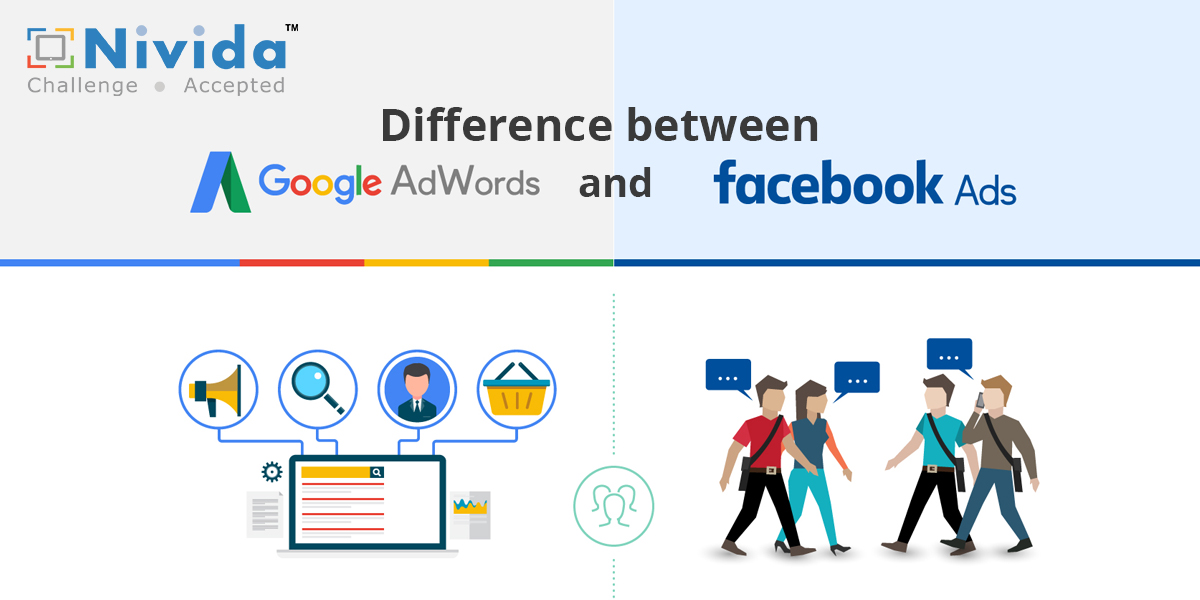When it comes to Internet advertising, two of the biggest players are Google and Facebook. To reach their combined monthly user bases of billions, each uses a different advertising model. Facebook and Google may appear to be interchangeable as advertising platforms due to their respective dominance in PPC advertising. This makes it tough for internet marketers to choose where to allocate their advertising budgets for maximum return on investment.
However, there is a significant difference between Facebook and Google in terms of advertising. In order to construct effective, high-converting internet advertising campaigns, a clever marketer must be familiar with the strengths and advantages of each platform.
Difference between Google Ads and Facebook Ads:
Google, as well as Facebook ads, share a lot of similarities on paper, as was previously discussed. Both Google and Facebook Ads are powerful online marketing tools because of their massive monthly user bases, pay-per-click advertising methods, and the ability to target certain demographics with pinpoint accuracy. However, there is where the parallels stop. Some of the key distinctions between the two are discussed below.
- You’ve been served:
- Text and graphics:
- Brand Building versus Lead building:
- Who sees what?
The way in which advertisements are presented to users is where Facebook and Google Ads differ most. Facebook's advertisements are displayed based on the user's interests, behaviour, and interactions with others, whereas Google's ads are shown in response to the user's precise search queries. In this sense, paid search advertising refers to Google Ads while paid social media advertising refers to Facebook Ads.
Ads on Google often have descriptive text and appear above, below, or alongside search results but lack any accompanying images. They are made to resemble search engine results in appearance. Rich media such as images and videos are used in Facebook ads to persuade viewers to interact with the content through likes, shares, and clicks.
Facebook ads are utilised mostly for brand awareness, whereas Google Ads are the most effective in generating leads. To rephrase, Facebook ads, direct potential buyers, to your business, while Google Ads direct potential buyers to your business.
The methods used to hone in on a specific demographic vary between the two media. To maximise the effectiveness of your Google Ads campaign, you should narrow your focus to the terms that will bring in the customers you're looking for. Your Facebook advertising will reach people who fit the demographic, interest, and behaviour parameters you specify.
Why Facebook Ads?
Facebook, the social network giant in the world, who gathers hundreds of data points about each user every month and has an estimated 2.7 billion monthly active members. It's little wonder that Facebook is a critical part of businesses as well as marketers’ online marketing efforts, given its massive user base and precise targeting options. Because of its immense popularity among advertisers, Facebook received around 25% of online advertising budgets for the year 2018.
Facebook provides a wide variety of advertisement placement choices, like as
- News Feed
- Marketplace
- Video Feeds
- Messenger
- Audience Network
- Instagram Feed
Why Google Ads?
Google Ads, priorly referred to as Google Adwords, is another industry giant in the realm of online promotional campaigns. Google.com receives more than 1 billion unique visitors per month and processes 6.9 billion searches per day. Google is obviously one of the most popular advertising platforms present online, particularly for PPC advertising, due to the sheer size of its user base and the amount of money that can be made from it. Although the vast majority of Google's advertisements appear in the form of links within the search engine results themselves, the company also provides a number of alternative advertising options, such as:
- Youtube ads
- Google Display Network
- Google Shopping
- Google Maps
- Google Play
Which one should you choose and why?
There are many elements to consider when deciding between advertising on Facebook vs advertising on Google, including campaign goals and whether or not you're looking to generate leads or raise brand awareness. Consider your intended market, the products or services you offer, the field in which you work, and the goals you hope to achieve from advertising. If you run a towing service, for example, you should focus your marketing efforts on Google rather than Facebook because this isn't a service that people often think about using unless something goes wrong with their vehicle.
Facebook and Google advertising, or a combination of the two, requires constant monitoring of campaign metrics in order to identify areas for improvement and make course corrections as needed. This will help keep your campaign on pace, guarantee you're reaching your target demographic, and keep your costs low so you can get an optimum ROI.

